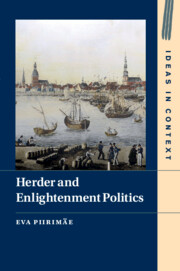2 results
Conclusion
-
- Book:
- Herder and Enlightenment Politics
- Published online:
- 30 March 2023
- Print publication:
- 06 April 2023, pp 324-333
-
- Chapter
- Export citation

Herder and Enlightenment Politics
-
- Published online:
- 30 March 2023
- Print publication:
- 06 April 2023

